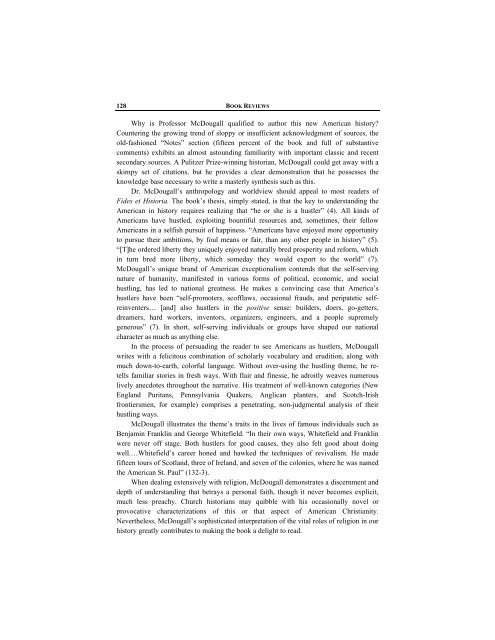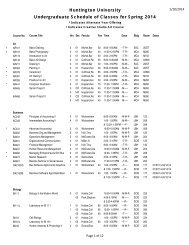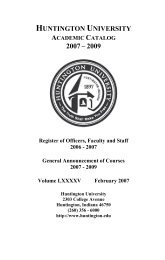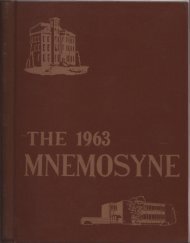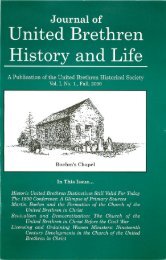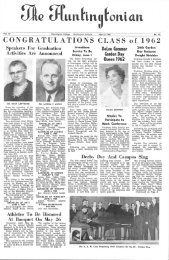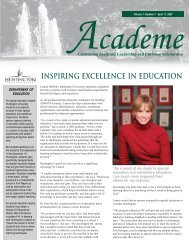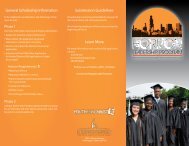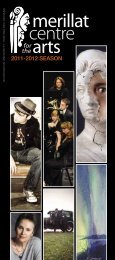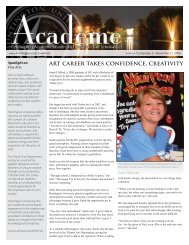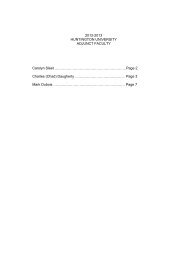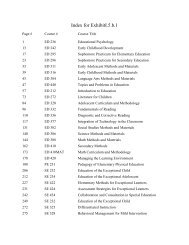Gillian Clark, Christianity and Roman Society - Huntington University
Gillian Clark, Christianity and Roman Society - Huntington University
Gillian Clark, Christianity and Roman Society - Huntington University
You also want an ePaper? Increase the reach of your titles
YUMPU automatically turns print PDFs into web optimized ePapers that Google loves.
128 BOOK REVIEWS<br />
Why is Professor McDougall qualified to author this new American history?<br />
Countering the growing trend of sloppy or insufficient acknowledgment of sources, the<br />
old-fashioned “Notes” section (fifteen percent of the book <strong>and</strong> full of substantive<br />
comments) exhibits an almost astounding familiarity with important classic <strong>and</strong> recent<br />
secondary sources. A Pulitzer Prize-winning historian, McDougall could get away with a<br />
skimpy set of citations, but he provides a clear demonstration that he possesses the<br />
knowledge base necessary to write a masterly synthesis such as this.<br />
Dr. McDougall’s anthropology <strong>and</strong> worldview should appeal to most readers of<br />
Fides et Historia. The book’s thesis, simply stated, is that the key to underst<strong>and</strong>ing the<br />
American in history requires realizing that “he or she is a hustler” (4). All kinds of<br />
Americans have hustled, exploiting bountiful resources <strong>and</strong>, sometimes, their fellow<br />
Americans in a selfish pursuit of happiness. “Americans have enjoyed more opportunity<br />
to pursue their ambitions, by foul means or fair, than any other people in history” (5).<br />
“[T]he ordered liberty they uniquely enjoyed naturally bred prosperity <strong>and</strong> reform, which<br />
in turn bred more liberty, which someday they would export to the world” (7).<br />
McDougall’s unique br<strong>and</strong> of American exceptionalism contends that the self-serving<br />
nature of humanity, manifested in various forms of political, economic, <strong>and</strong> social<br />
hustling, has led to national greatness. He makes a convincing case that America’s<br />
hustlers have been “self-promoters, scofflaws, occasional frauds, <strong>and</strong> peripatetic selfreinventers…<br />
[<strong>and</strong>] also hustlers in the positive sense: builders, doers, go-getters,<br />
dreamers, hard workers, inventors, organizers, engineers, <strong>and</strong> a people supremely<br />
generous” (7). In short, self-serving individuals or groups have shaped our national<br />
character as much as anything else.<br />
In the process of persuading the reader to see Americans as hustlers, McDougall<br />
writes with a felicitous combination of scholarly vocabulary <strong>and</strong> erudition, along with<br />
much down-to-earth, colorful language. Without over-using the hustling theme, he retells<br />
familiar stories in fresh ways. With flair <strong>and</strong> finesse, he adroitly weaves numerous<br />
lively anecdotes throughout the narrative. His treatment of well-known categories (New<br />
Engl<strong>and</strong> Puritans, Pennsylvania Quakers, Anglican planters, <strong>and</strong> Scotch-Irish<br />
frontiersmen, for example) comprises a penetrating, non-judgmental analysis of their<br />
hustling ways.<br />
McDougall illustrates the theme’s traits in the lives of famous individuals such as<br />
Benjamin Franklin <strong>and</strong> George Whitefield. “In their own ways, Whitefield <strong>and</strong> Franklin<br />
were never off stage. Both hustlers for good causes, they also felt good about doing<br />
well.…Whitefield’s career honed <strong>and</strong> hawked the techniques of revivalism. He made<br />
fifteen tours of Scotl<strong>and</strong>, three of Irel<strong>and</strong>, <strong>and</strong> seven of the colonies, where he was named<br />
the American St. Paul” (132-3).<br />
When dealing extensively with religion, McDougall demonstrates a discernment <strong>and</strong><br />
depth of underst<strong>and</strong>ing that betrays a personal faith, though it never becomes explicit,<br />
much less preachy. Church historians may quibble with his occasionally novel or<br />
provocative characterizations of this or that aspect of American <strong>Christianity</strong>.<br />
Nevertheless, McDougall’s sophisticated interpretation of the vital roles of religion in our<br />
history greatly contributes to making the book a delight to read.


